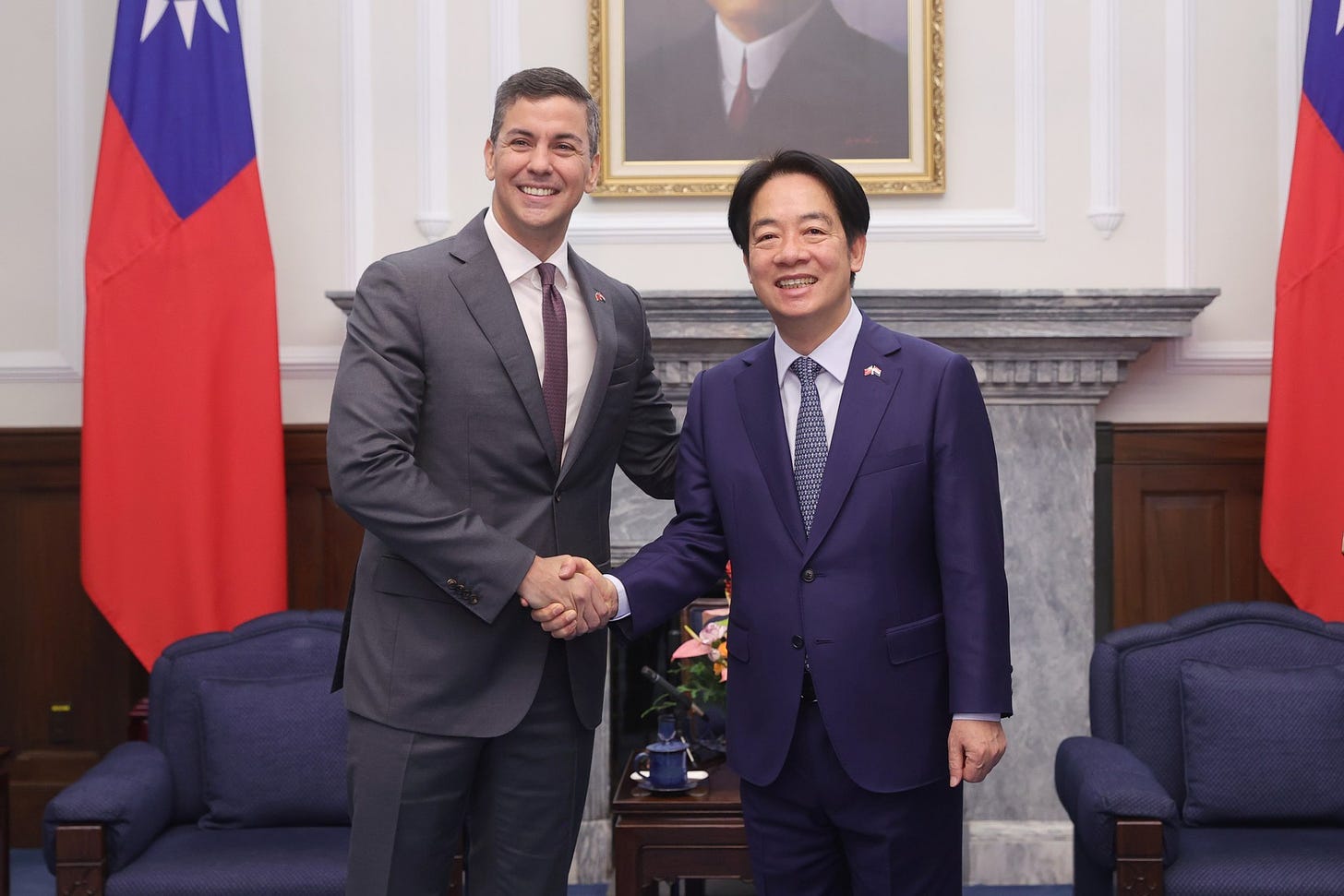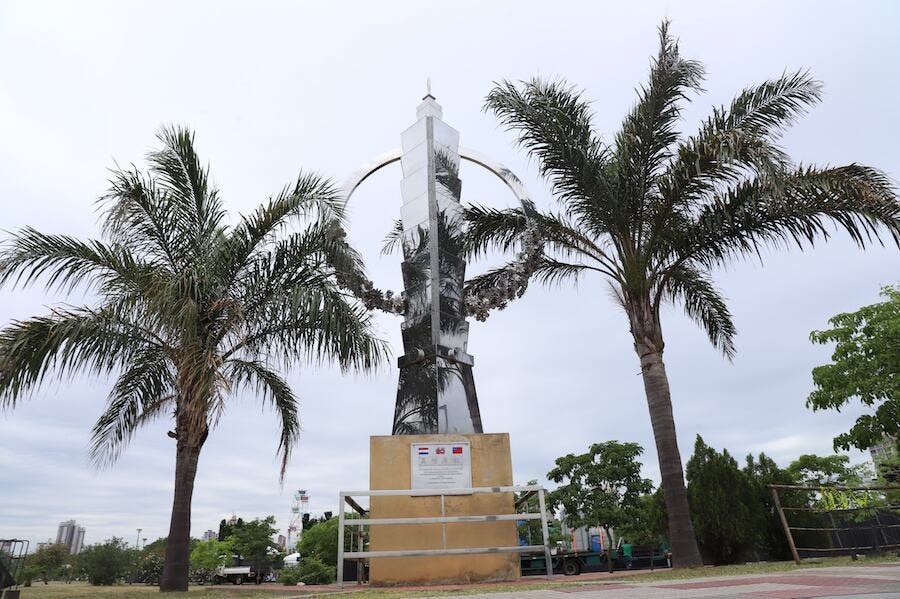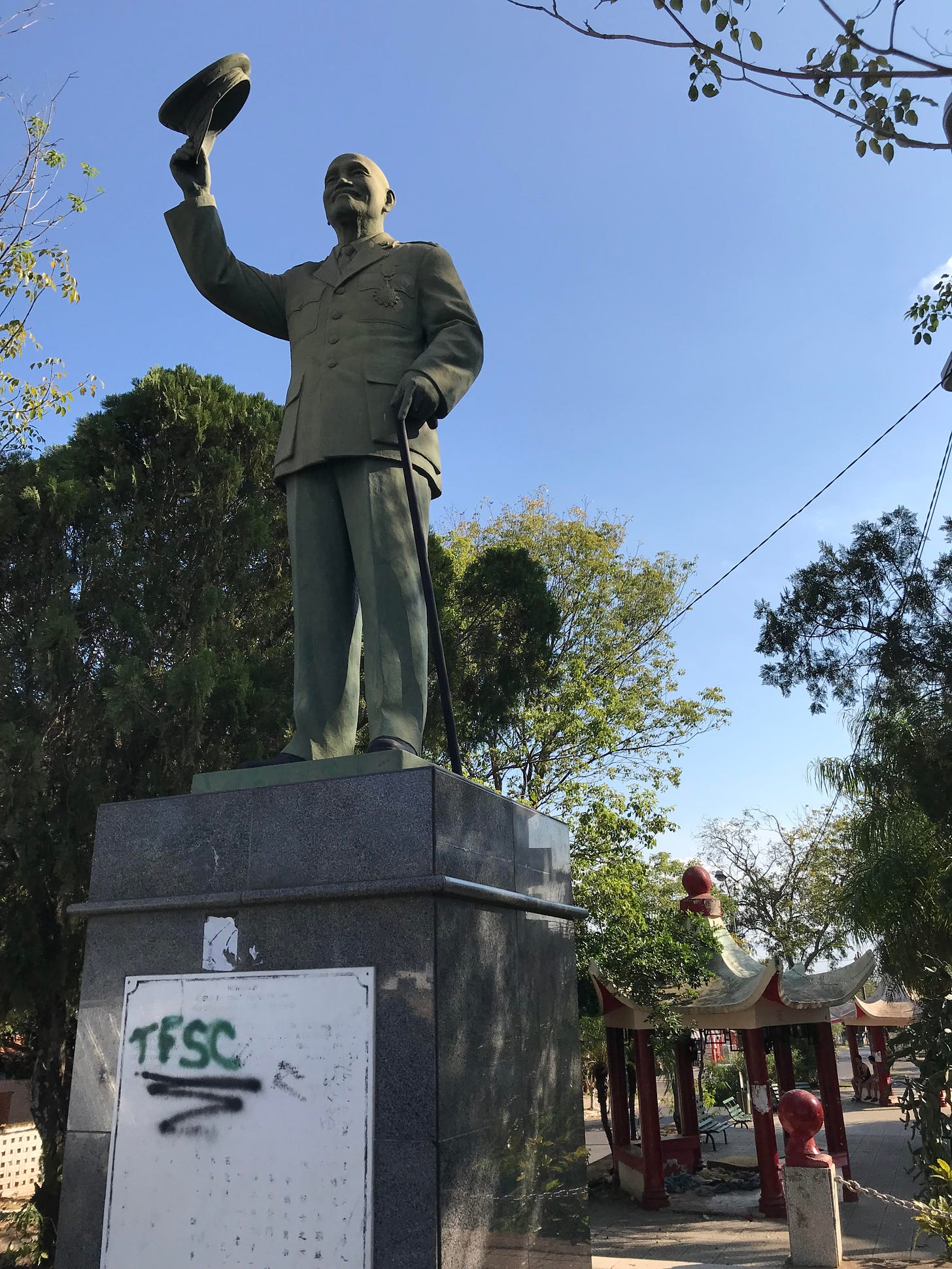
Welcome back to The Weekly Post! Scroll down for more news and cultural highlights.
Don’t forget to subscribe — and check to make sure our emails are landing in your main inbox.
Last week, China’s leader Xi Jinping visited Peru to cut the ribbon on a $1.3bn deepwater port. The megaproject at Chancay is the South American capstone of the Belt and Road Initiative, which has seen the People’s Republic of China (PRC) spend tens of billions of dollars on highways, harbours and railways across the continent, ramp up trade with the region to $450bn in 2021 — up from $12bn in 2000 — and invest billions more to capture new markets and allies.
Meanwhile, in Paraguay — the only country in South America that lacks diplomatic relations with Beijing, and one of just 12 worldwide to instead recognise Taiwan as the legitimate Republic of China (ROC) — Taiwanese ambassador José Chih-Cheng Han took time out of his schedule last week to participate in World Sandwich Day.
I don’t mean to make a cheap dig at Taiwan. The small island nation and its Paraguayan antipode go way back, having struck up a close friendship nearly 70 years ago in the days of Alfredo Stroessner and Chiang Kai-shek, both fervent anti-communists. Tens of millions of dollars in gifts, loans, and cash have flown almost entirely in one direction ever since.
Taipei provides patrol cars, university places, agronomists, and medicines. It paid for Paraguay’s congress building, donated its presidential jet, and hosts Paraguayan politicos and business figures on all-expenses-paid trips. In 2023, Taiwan was the second-biggest importer of Paraguayan beef.
But all this is a drop in the ocean compared to what Beijing is offering. The world has changed since 1949, when Mao Zedong seized control of an impoverished, war-ravaged nation of 500 million souls and his defeated enemies set up a government-in-exile across the Taiwan Strait. The PRC is now a superpower cornering a fifth of the world’s population and GDP. It has an internal market of 1.4 billion, is the top trading partner for most of South America, and its military rivals the US for supremacy, especially at sea.
The Chancay project illustrates what China promises Latin America: and what it wants in return. The harbour 50 miles north of Lima — President Xi wrote for Peruvian media — will generate $4.5bn in local revenue, create 8,000 direct jobs and slash costs for those exporting goods to China by 20 percent. Officials said the ultimate plan is to build a $3.5 billion railway linking the port to soybean producers in Brazil, China’s top supplier of the feed grain. US military figures have meanwhile warned that Chancay, run by Chinese state firm Cosco, could be used by Beijing’s warships and spies.
Yet most Latin American countries are eagerly lining up to be the next beneficiary of Xi’s spending spree. Multiple regional allies of Taiwan — Honduras, Nicaragua, the Dominican Republic, Panama — have switched recognition to Beijing in recent years. The remaining holdouts are mostly tiny island nations. And Paraguay isn’t immune to Beijing’s blandishments either. It loses out on Chinese loans and investment worth 1 percent of GDP every year, according to one recent estimate.
With so much at stake, the relationship with Taiwan has become nakedly transactional. Speaking to the FT, former president Mario Abdo Benítez suggested Taiwan would have to invest US$1bn every year for him to be able to “make the argument” for ongoing recognition. Opposition leader Efraín Alegre took up the theme during last year’s election. “The current relationship is insufficient,” he told Reuters, hinting that a switch to China would better reflect the “national interest”.
The current government of Santiago Peña has poured cold water on any talk of ditching Taiwan: partly, it seems, a way to curry favour with the US. Millions of tonnes of Paraguayan soybean are indirectly exported to China anyway, mixed in with the Southern Cone’s harvest in Uruguayan depots. Taipei has no problem with Asunción doing business with Beijing — then-ambassador Diego Chou told me a few years ago — as long as it still recognises Taiwan. “We’re not a superpower,” he added, somewhat redundantly. “But we’ve always been by Paraguay’s side.”
The problem is that Xi doesn’t let his clients pick and choose. Full diplomatic recognition is a sine qua non to unlock the full range of benefits the PRC provides. Uruguay — another small agricultural economy — shows what’s on offer. Last year, I visited a ranch rearing premium Wagyu beef for increasingly discerning Chinese consumers. The owner of a major slaughterhouse said Jack Ma, the Alibaba founder worth $24bn, had recently dropped by. A quarter of Uruguay’s exports now go to China. Beijing is dangling the prospect of a free trade agreement, and has sold Montevideo a fleet of 100 gleaming electric buses.
Like most people in Paraguay, I’m not losing sleep over the issue. I don’t think soybean and beef barons should dictate the country’s foreign policy. But other major markets — the United States, the EU — are not exactly rolling out the red carpet for Paraguay’s top exports. And while a switch to Beijing wouldn’t transform the country overnight, it could unlock credit and investment sorely needed to level up Paraguay’s infrastructure and woeful social services.
If Paraguay’s current crop of legislators were of a higher calibre, these are the kinds of debates they might be having. Paraguay could be playing Beijing, Taipei and DC off against each other to get the best deal. How about friendshoring a slice of Taiwan’s flagship microchip industry to Ciudad del Este?
But for now, Paraguay gets Taiwanese TV shows, fitness machines and sandwich memes. And Donald Trump is meanwhile musing about cutting Taiwan loose unless it spends more on defence. The calls to reassess the relationship between the plum blossom and the passion flower will keep getting louder.

What’s Happening:
Late on Friday, Peña signed the deeply controversial “ley garrote” into law. The bill — which requires NGOs to disclose the origins and destination of foreign funds in a quarterly government register, or face suspension — has been criticised by pretty much everyone, from credit ratings agencies to the Committee to Protect Journalists. But it seems the president was unable — or unwilling — to veto the bill and stand up to Leite, Calé and Cartes. Peña has softened it a little by removing the proposed fines and jail sentences, and says it will be implemented “in a participatory way with all the affected sectors.” But the vague wording and sweeping scope remain intact. The law is already having a chilling effect on civil society and spooking overseas investors, creditors and donors. More here:
On Sunday, leading figures from the opposition began a five-day protest march. The demonstration set off after hearing mass in Caacupé and will hold meetings in several towns, culminating in a rally outside the Palacio de López on Thursday. Former senator Kattya González, National Campesino Federation (FNC) leader Teodolina Villalba, congresswoman Johanna Ortega and Miguel Prieto, the mayor of Ciudad del Este, are among those taking part. It’s a strong show of unity, but their demands —“justice for every injustice,” with a heavy emphasis on corruption — may prove too abstract to capture public attention.
Maxi Manzoni is the only accredited journalist from Paraguay covering COP29 in Baku. It’s a crucial year for the UN climate conference, with discussions around the global carbon market and climate finance on the table. Paraguay hopes to secure $5bn to help it mitigate the impacts of global heating. Yet Paraguay’s delegation is tiny, Maxi reports for Consenso, with a heavy presence for agribusiness — and no representative from Indigenous communities, already among the hardest hit by drought and fires. And there are rifts within Paraguay’s negotiating bloc SUR, with Javier Milei’s Argentina abruptly pulling out of the conference for unclear reasons.
Culture Corner
💃❤️✨ Experimental dance troupe Cía Transito are putting on their latest show FIESTA this Thursday and Friday. They’ve not giving away much online but I’m expecting aerial acrobatics, theatre, music, and a general party atmosphere. Reserve here or at 0986105017. (Espacio E, Estrella 977, 8.30pm)
🤖🚀👾 EXPYFEST 2024 is here. Paraguay’s inaugural immersive art festival is on Saturday at the Alianza Francesa, and features augmented reality, live video projection mapping performances, audiovisual content, and artificial intelligence. No, none of that makes much sense to me either, but there will also be talks and workshops, along with DJ sessions and live music. Sounds like an interesting preview of the artforms we’ll all have beamed into our frontal cortex before long. (Mcal. Estigarríbia between Estados Unidos/Brasil, 9am to midnight, G30,000)
🎬🚂💰 I’m ten years late, but last weekend I got the chance to watch two fantastic documentaries by Paraguayan director Mauricio Rial Banti at Cine del Barrio. TREN PARAGUAY (2011) is a haunting look inside Paraguay’s rusting railway heritage, as seen through the eyes of old-timers who remember the locomotives steaming through. The train brought a flurry of social activity, and entered folk mythology as a vengeful deity that carried off cows and killed dozing drunks. OVERAVA (2012) profiles those searching for plata yvyguy: underground riches reputedly buried during the Triple Alliance War (1864-70). Far from faithless tomb raiders, the treasure-hunters are deeply superstitious, making offerings to appease the spirits guarding the hoard. Both films are well worth a look if you can find them online.
In other news: Peña orders attack aircraft | drought wipes out cattle | funding police via YouTube | La Albirroja bring down the world champions | BID president visits | Lula invites Peña to the G20 | A bullet train in Asunción? | No roofs, no walls: wisdom of Gustavo Alfaro








I have never been a supporter of the Colorado party, however I agree with their take on China. Accepting their infrastructure projects would be a deal with the devil. Akin to predatory lending. Materials, equipment and skilled jobs will be Chinese. Paraguay will be left with low wages, high debt and more corruption.